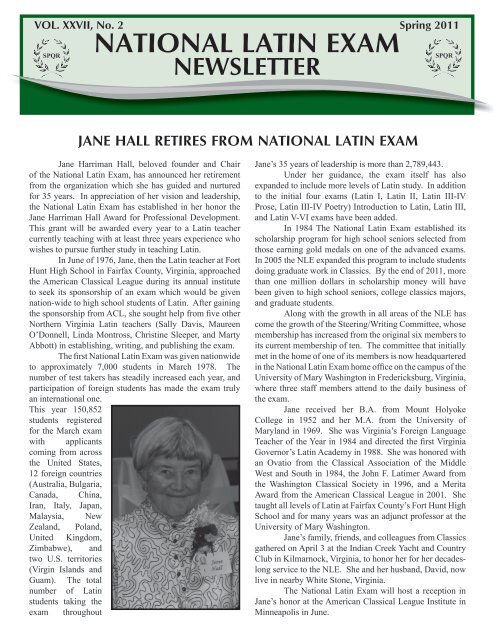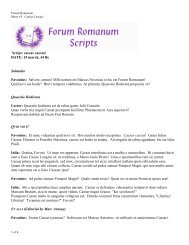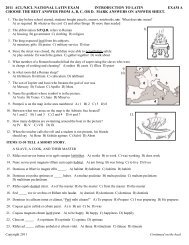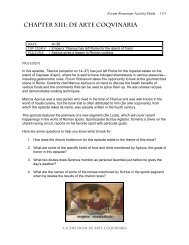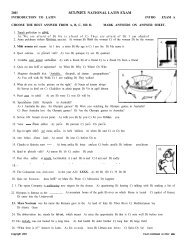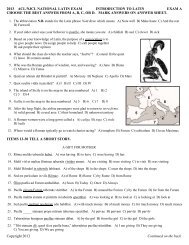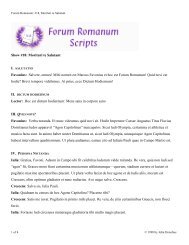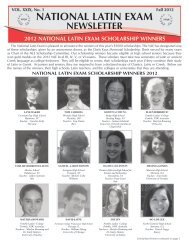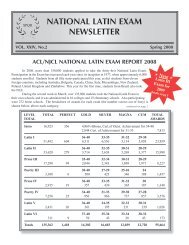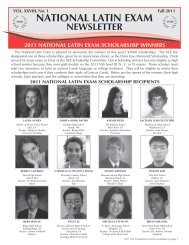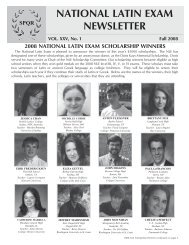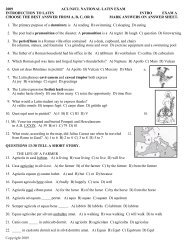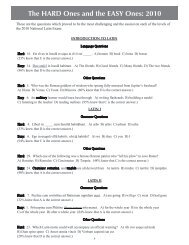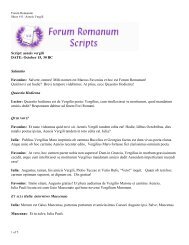The National Latin Exam
The National Latin Exam
The National Latin Exam
You also want an ePaper? Increase the reach of your titles
YUMPU automatically turns print PDFs into web optimized ePapers that Google loves.
VOL. XXVII, No. 2 Spring 2011<br />
NATIONAL LATIN EXAM<br />
SPQR SPQR<br />
NEWSLETTER<br />
JANE HALL RETIRES FROM NATIONAL LATIN EXAM<br />
Jane Harriman Hall, beloved founder and Chair<br />
of the <strong>National</strong> <strong>Latin</strong> <strong>Exam</strong>, has announced her retirement<br />
from the organization which she has guided and nurtured<br />
for 35 years. In appreciation of her vision and leadership,<br />
the <strong>National</strong> <strong>Latin</strong> <strong>Exam</strong> has established in her honor the<br />
Jane Harriman Hall Award for Professional Development.<br />
This grant will be awarded every year to a <strong>Latin</strong> teacher<br />
currently teaching with at least three years experience who<br />
wishes to pursue further study in teaching <strong>Latin</strong>.<br />
In June of 1976, Jane, then the <strong>Latin</strong> teacher at Fort<br />
Hunt High School in Fairfax County, Virginia, approached<br />
the American Classical League during its annual institute<br />
to seek its sponsorship of an exam which would be given<br />
nation-wide to high school students of <strong>Latin</strong>. After gaining<br />
the sponsorship from ACL, she sought help from five other<br />
Northern Virginia <strong>Latin</strong> teachers (Sally Davis, Maureen<br />
O’Donnell, Linda Montross, Christine Sleeper, and Marty<br />
Abbott) in establishing, writing, and publishing the exam.<br />
<strong>The</strong> first <strong>National</strong> <strong>Latin</strong> <strong>Exam</strong> was given nationwide<br />
to approximately 7,000 students in March 1978. <strong>The</strong><br />
number of test takers has steadily increased each year, and<br />
participation of foreign students has made the exam truly<br />
an international one.<br />
This year 150,852<br />
students registered<br />
for the March exam<br />
with applicants<br />
coming from across<br />
the United States,<br />
12 foreign countries<br />
(Australia, Bulgaria,<br />
Canada, China,<br />
Iran, Italy, Japan,<br />
Malaysia, New<br />
Zealand, Poland,<br />
United Kingdom,<br />
Zimbabwe), and<br />
two U.S. territories<br />
(Virgin Islands and<br />
Guam). <strong>The</strong> total<br />
number of <strong>Latin</strong><br />
students taking the<br />
exam throughout<br />
Jane’s 35 years of leadership is more than 2,789,443.<br />
Under her guidance, the exam itself has also<br />
expanded to include more levels of <strong>Latin</strong> study. In addition<br />
to the initial four exams (<strong>Latin</strong> I, <strong>Latin</strong> II, <strong>Latin</strong> III-IV<br />
Prose, <strong>Latin</strong> III-IV Poetry) Introduction to <strong>Latin</strong>, <strong>Latin</strong> III,<br />
and <strong>Latin</strong> V-VI exams have been added.<br />
In 1984 <strong>The</strong> <strong>National</strong> <strong>Latin</strong> <strong>Exam</strong> established its<br />
scholarship program for high school seniors selected from<br />
those earning gold medals on one of the advanced exams.<br />
In 2005 the NLE expanded this program to include students<br />
doing graduate work in Classics. By the end of 2011, more<br />
than one million dollars in scholarship money will have<br />
been given to high school seniors, college classics majors,<br />
and graduate students.<br />
Along with the growth in all areas of the NLE has<br />
come the growth of the Steering/Writing Committee, whose<br />
membership has increased from the original six members to<br />
its current membership of ten. <strong>The</strong> committee that initially<br />
met in the home of one of its members is now headquartered<br />
in the <strong>National</strong> <strong>Latin</strong> <strong>Exam</strong> home office on the campus of the<br />
University of Mary Washington in Fredericksburg, Virginia,<br />
where three staff members attend to the daily business of<br />
the exam.<br />
Jane received her B.A. from Mount Holyoke<br />
College in 1952 and her M.A. from the University of<br />
Maryland in 1969. She was Virginia’s Foreign Language<br />
Teacher of the Year in 1984 and directed the first Virginia<br />
Governor’s <strong>Latin</strong> Academy in 1988. She was honored with<br />
an Ovatio from the Classical Association of the Middle<br />
West and South in 1984, the John F. Latimer Award from<br />
the Washington Classical Society in 1996, and a Merita<br />
Award from the American Classical League in 2001. She<br />
taught all levels of <strong>Latin</strong> at Fairfax County’s Fort Hunt High<br />
School and for many years was an adjunct professor at the<br />
University of Mary Washington.<br />
Jane’s family, friends, and colleagues from Classics<br />
gathered on April 3 at the Indian Creek Yacht and Country<br />
Club in Kilmarnock, Virginia, to honor her for her decadeslong<br />
service to the NLE. She and her husband, David, now<br />
live in nearby White Stone, Virginia.<br />
<strong>The</strong> <strong>National</strong> <strong>Latin</strong> <strong>Exam</strong> will host a reception in<br />
Jane’s honor at the American Classical League Institute in<br />
Minneapolis in June.
THE JANE HARRIMAN HALL PROFESSIONAL DEVELOPMENT<br />
SCHOLARSHIP IS ANNOUNCED BY NLE<br />
Purpose<br />
<strong>The</strong> Jane Harriman Hall Professional Development Scholarship is designed to support teachers in their<br />
ability to teach <strong>Latin</strong>. <strong>The</strong> scholarship was developed in honor of Jane Harriman Hall, founder of the<br />
<strong>National</strong> <strong>Latin</strong> <strong>Exam</strong>, in order to continue her efforts to bring high quality <strong>Latin</strong> instruction to students<br />
throughout the United States.<br />
Eligibility<br />
Applicants must be current teachers of <strong>Latin</strong> at the pre-K—12 level in public or private schools in the<br />
United States who spend at least 50% of their instructional time with students. Applicants are eligible<br />
for the award only once every ten years.<br />
Funding<br />
Scholarships will be awarded based on the impact they will have on students and effective use of the<br />
funds. A total of $5,000 will be allocated to the scholarship annually. This may result in one or more<br />
awards being given, based on the number and quality of the proposals.<br />
Term of the Award<br />
This annual scholarship may be used any time from January through December of the year in which it<br />
is awarded.<br />
Application process:<br />
Applications should be sent to:<br />
Deadline for application:<br />
October 1, 2011<br />
<strong>The</strong> <strong>National</strong> <strong>Latin</strong> <strong>Exam</strong> Office<br />
<strong>The</strong> Jane Harriman Hall Professional Development Scholarship<br />
<strong>The</strong> University of Mary Washington<br />
1301 College Avenue<br />
Fredericksburg, VA 22401<br />
nle@umw.edu<br />
Telephone: 1-888-378-7721<br />
Applications are available at www.nle.org
ACL/NJCL NATIONAL LATIN EXAM REPORT 2011<br />
In 2011 more than 150,000 students applied to take the thirty-fourth <strong>National</strong> <strong>Latin</strong> <strong>Exam</strong>. Participation<br />
in the <strong>Exam</strong> has increased each year since its inception in 1977, when approximately 6,000<br />
students enrolled. Students from all fifty states participated this year, as did students from 12 foreign<br />
countries, including Australia, Bulgaria, Canada, China, Italy, Japan, New Zealand, Poland, United Kingdom<br />
and Zimbabwe. This year, for the first time, students from Iran and Malaysia also took the NLE. In<br />
addition, students in two U.S. territories, Guam and the U.S. Virgin Islands, participated this year.<br />
During the second week in March, over 137,000 students in 2,848 schools took the <strong>National</strong> <strong>Latin</strong><br />
<strong>Exam</strong> in their own schools, and the exam was administered in 21 colleges and 10 elementary schools.<br />
Also participating were 1,973 students from 399 home schools. <strong>The</strong> breakdown of awards for each exam<br />
(the number correct out of forty) is shown below, above each category.<br />
LEVEL TOTAL PERFECT GOLD SILVER MAGNA CUM<br />
Intro 18,175 328 328 ribbons, Perfect Paper Cert. for 40<br />
4,144 ribbons, Cert.of Outst. Achievement for 35-39<br />
3<br />
TOTAL<br />
AWARDS<br />
4,195 Cert. of Achievement for 31-34 8,667<br />
<strong>Latin</strong> I 36-40 33-35 31-32 29-30<br />
51,932 295 4,899 6,588 5,352 5,915 22,754<br />
<strong>Latin</strong> II 33-40 30-32 27-29 25-26<br />
33,726 98 3,751 3,531 4,529 3,348 15,159<br />
<strong>Latin</strong> III 35-40 32-34 29-31 27-28<br />
15,615 88 1,438 1,577 2,230 1,515 6,760<br />
Prose III 35-40 32-34 29-31 27-28<br />
4,296 27 441 422 623 477 1,963<br />
Poetry III 32-40 29-31 26-28 24-25<br />
1,670 4 185 159 208 175 727<br />
Prose IV 35-40 32-34 29-31 27-28<br />
3,212 12 316 332 486 360 1,494<br />
Poetry IV 35-40 32-34 30-31 28-29<br />
6,439 23 710 796 659 634 2,799<br />
<strong>Latin</strong> V 36-40 33-35 31-32 28-30<br />
2416 13 252 258 217 379 1,106<br />
<strong>Latin</strong> VI 37-40 35-36 33-34 30-32<br />
338 8 41 24 30 58 153<br />
Totals 137, 819 896 12,033 13,687 14,334 12,861 52,915<br />
continued on page 4
<strong>Exam</strong> Report 2011<br />
continued from page 3<br />
<strong>The</strong>re were 568 perfect papers in <strong>Latin</strong> I-VI. A<br />
congratulatory letter has been sent to the principal of each<br />
school with copies for the student, the <strong>Latin</strong> teacher, and<br />
the student’s permanent record. In addition, a special<br />
hand-lettered certificate was sent to each of these students.<br />
<strong>The</strong> twenty-three students who have three years of perfect<br />
papers and the three students who have four years of perfect<br />
papers are being sent the Carter Stubbs Drake Goad<br />
Memorial Book Award in addition to the special certificate.<br />
In the Introduction to <strong>Latin</strong> <strong>Exam</strong>, which was<br />
taken by 18,175 students, 8,667 students won awards. As<br />
the average number correct on this <strong>Exam</strong> was 30, students<br />
who scored 31-34 correct out of forty received Certificates<br />
of Achievement, and scores of 35-39 received Certificates<br />
of Outstanding Achievement and purple ribbons. <strong>The</strong> 328<br />
students who answered all 40 questions correctly were<br />
sent a special congratulatory letter in addition to a special<br />
certificate of merit for a perfect score.<br />
<strong>The</strong>re were 836 seniors who won gold medals<br />
on the <strong>Latin</strong> III, III-IV Prose, III-IV Poetry, or the <strong>Latin</strong><br />
V-VI <strong>Exam</strong>. <strong>The</strong>se students are eligible for one of the<br />
twenty-one $1000 scholarships, including one from an<br />
anonymous donor. In addition, a $2000 scholarship will<br />
be awarded for post graduate study leading to the teaching<br />
of <strong>Latin</strong> and/or Greek at the elementary, intermediate, or<br />
high school level. <strong>The</strong>se scholarship awards will be announced<br />
by NLE Scholarship Chair, Ephy Howard, at the<br />
ACL Institute at the University of Minnesota in Minneapolis,<br />
MN, in June. <strong>The</strong> <strong>National</strong> <strong>Latin</strong> <strong>Exam</strong> Scholarship<br />
Committee, formed in 1983, consists of Ephy Howard,<br />
Chair, and members Cathy Daugherty, Judith de Luce,<br />
Gaylan DuBose, Edith Foster, Sue Gillen, and Sandra<br />
Woodward. Linda S. Montross serves as the Scholarship<br />
Liaison. <strong>The</strong> scholarship recipients from 2010, 2009, and<br />
2008, are eligible for an additional $1000 if they continue<br />
their study of <strong>Latin</strong> and/or Greek. In 2010, the <strong>National</strong><br />
<strong>Latin</strong> <strong>Exam</strong> awarded $51,000 in scholarships.<br />
<strong>The</strong> Maureen O’Donnell Oxford Classical Dictionary<br />
Award, given to students who win four gold medals,<br />
is being sent to 403 students this year in recognition<br />
of their outstanding achievement. <strong>The</strong> 80 students who<br />
have won five gold medals, the two students who have<br />
won six gold medals, and the one student who has won<br />
seven gold medals will be sent special book awards. <strong>The</strong><br />
2011 PERFECT PAPER and GOLD MEDAL winners<br />
will be published in Torch U.S., the publication of the<br />
<strong>National</strong> Junior Classical League.<br />
In September, the <strong>National</strong> <strong>Latin</strong> <strong>Exam</strong> office sent<br />
the application for the 2011 <strong>National</strong> <strong>Latin</strong> <strong>Exam</strong> to teachers<br />
who participated in the 2010 NLE. Upon receipt of<br />
the application and payment, a postcard was sent from the<br />
4<br />
NLE office to the teacher, verifying the number of applicants<br />
and informing the teacher that the exams and answer<br />
sheets would be mailed by the United Parcel Service to<br />
the <strong>Exam</strong> administrator or principal by February 20, 2011.<br />
Clement Testing Service mailed out the exams,<br />
answer sheets, and instructions and scored the returned<br />
answer sheets. <strong>The</strong> company also mailed out the results,<br />
awards, exam answers, and a congratulatory letter to the<br />
teacher by April 20, 2011. A copy of the congratulatory<br />
letter for the principal was included in this package. <strong>The</strong><br />
national percent correct for each question is included<br />
as well as the percent correct on each question for the<br />
individual school. Both percentages are being provided<br />
in order to help teachers and students assess strengths and<br />
weaknesses.<br />
<strong>The</strong> chart given below indicates the states with the greatest<br />
number of students taking the 2011 exam and those showing<br />
the greatest increase in percentage of those participating.<br />
<strong>The</strong> states with the greatest number of<br />
students taking the 2011 <strong>Exam</strong>s:<br />
Massachusetts 11,766<br />
New York 11,183<br />
Virginia 9,710<br />
Texas 9,229<br />
Pennsylvania 8,494<br />
New Jersey 8,443<br />
Ohio 7,173<br />
California 7,033<br />
Connecticut 5,947<br />
Georgia 5,252<br />
<strong>The</strong> states with the greatest % increase in<br />
number of students<br />
taking the 2011 <strong>Exam</strong>s:<br />
Montana 35%<br />
District of Columbia 22%<br />
Colorado 20%<br />
Arkansas 20%<br />
Vermont 19%<br />
Kentucky 17%<br />
North Dakota 16%<br />
Idaho 15%<br />
Florida 14%<br />
Mississippi 13%<br />
<strong>The</strong> members of the NLE Advisory Committee<br />
are Susan McDonald, Chair (FL), Nancy Czupik (OH),<br />
Liane Houghtalin (VA), Caroline Switzer Kelly (NC),<br />
Stephen Lee Pearce (LA), Tom Sienkewicz (IL), James<br />
Updegraff (CA), Matthew Webb (NH), Sandra Woodward<br />
(UT) and Athanasia Worley (KS). <strong>The</strong>y will be meeting<br />
at the 2011 ACL Institute to review and discuss the 2011<br />
exam. <strong>The</strong> members of this Committee represent the<br />
continued on page 6
BLOCK SCHEDULING RESULTS FOR 2011 NATIONAL LATIN EXAM<br />
Again on the 2011 NLE application, teachers were asked to indicate if they taught on a semester-block (4 by 4) schedule.<br />
Of the students taking the exam, 5468 in 151 schools were taught on this type schedule. <strong>The</strong>se students’ test scores were<br />
examined and compared with the mean scores of students on traditional schedules. <strong>The</strong> results are below:<br />
Block + Non Block Non Block Block<br />
Number of Mean Number of Mean Number of Mean<br />
Students Score Students Score Students Score<br />
INTRO 18,178 30 17,831 30 347 28<br />
LATIN I 51,949 28 49,890 28 2,059 26<br />
LATIN II 33,752 24 32, 138 24 1,614 22<br />
LATIN III 15,632 26 14,864 26 768 25<br />
PROSE III 4,300 26 4,233 26 67 23<br />
PROSE IV 3,215 26 3,014 26 201 24<br />
POETRY III 1,678 23 1,609 23 69 20<br />
POETRY IV 6,447 27 6,238 27 209 26<br />
LATIN V 2,416 27 2,322 27 94 27<br />
LATIN VI 337 29 297 29 40 30<br />
TOTALS 137,904 27 132,541 27 5,468 26<br />
THE 2011 NLE SCORES OF HOME SCHOOLED STUDENTS<br />
According to the 2011 NLE applications, 1973 students taking the exam were taught in 399 home schools. <strong>The</strong>se students’<br />
test scores were examined and compared with the mean scores of students in traditional schools. <strong>The</strong> results are below.<br />
Home Sch + Traditional Traditional Home School<br />
Number of Mean Number of Mean Number of Mean<br />
Students Score Students Score Students Score<br />
INTRO 18,178 30 17,620 30 558 31<br />
LATIN I 51,949 28 51,217 28 732 30<br />
LATIN II 33,752 24 33,394 24 358 27<br />
LATIN III 15,632 26 15,449 26 183 29<br />
PROSE III 4,300 26 4,250 26 50 31<br />
PROSE IV 3,215 26 3,170 26 45 30<br />
POETRY III 1,678 23 1,667 23 11 31<br />
POETRY IV 6,447 27 6,426 27 21 29<br />
LATIN V 2,416 27 2,408 27 8 33<br />
LATIN VI 337 29 330 29 7 36<br />
TOTALS 137,904 27 135,931 27 1,973 31<br />
5
<strong>Exam</strong> Report 2011<br />
continued from page 4<br />
various geographic areas of the country, middle and high<br />
schools, colleges, and public and private schools.<br />
<strong>The</strong> <strong>National</strong> Association of Secondary School<br />
Principals has voted to place the <strong>National</strong> <strong>Latin</strong> <strong>Exam</strong> on<br />
the Advisory List of <strong>National</strong> Contests and Activities for<br />
2011-2012. This list will be distributed to all secondary<br />
schools in the United States in September of 2011.<br />
For the Introduction to <strong>Latin</strong>, <strong>Latin</strong> I, II, III, III/<br />
IV Prose, and III/IV Poetry exams, there are 40 multiplechoice<br />
questions on grammar, comprehension, mythology,<br />
derivatives, literature, Roman life, history, and geography.<br />
<strong>The</strong> <strong>Latin</strong> V-VI exam contains two <strong>Latin</strong> passages as the<br />
basis for 40 multiple-choice questions on grammar, comprehension,<br />
historical background, classical literature, and<br />
literary devices. <strong>The</strong> time limit for the exams is 45 minutes.<br />
<strong>The</strong> Steering/Writing Committee consists of Jane<br />
H. Hall (Co-Chair), Mark Keith (Co-Chair), Joe Davenport,<br />
Sally Davis, Elizabeth Heimbach, Ian Hochberg,<br />
Patricia Lister, Betty Merrill (Newsletter), Linda Montross,<br />
and Sue Robertson. Christine Sleeper, one of the original<br />
founders of the NLE, has been honored with Emerita status.<br />
<strong>The</strong> committee began writing the exams in the spring of<br />
2010. By the middle of August it began the difficult task of<br />
reviewing each exam with respect to the level of difficulty,<br />
accuracy, and content. After several revisions, the exams<br />
were sent to consultants Marty Abbott, Michael Bales,<br />
Sheila Dickison, John Donohue, Kathy Elifrits, Kevin<br />
Gushman, Ruth Haukeland, Nancy Llewellyn, David Perry,<br />
and Wallace Ragan for their in-depth critiques. Acting<br />
upon their suggestions, the Committee made further revisions.<br />
After a final reading and revision, 166,000 copies of<br />
the exams were printed.<br />
<strong>The</strong> 2011 exam required sixteen working sessions<br />
averaging three and a half hours each to complete the<br />
work associated with the exams. In addition to the general<br />
working sessions, each Committee member spent countless<br />
hours taking care of specific tasks such as writing exam<br />
questions, answering correspondence, word processing,<br />
record keeping, publicizing the exam, ordering supplies,<br />
and writing newsletter articles.<br />
<strong>The</strong> NLE Office Manager Janine Kuty, Administrative<br />
Assistant Ellen Smith, and student aide Matt Wallace<br />
tended to numerous NLE matters such as registering<br />
schools for the exam, processing exam fees, answering<br />
daily phone calls and e-mails, handling bookkeeping, and<br />
mailing newsletters, postcards, Awards Letters, and Perfect<br />
Paper Certificates.<br />
<strong>The</strong> tip sheet which was sent out with the application<br />
continues to have a very positive effect. Many<br />
more applications came in December, and there were not<br />
6<br />
as many frantic calls about needing more exams and/or<br />
answer sheets.<br />
Copies of the four previous exams and the <strong>National</strong><br />
<strong>Latin</strong> <strong>Exam</strong> Syllabus are available for purchase from the<br />
American Classical League office in Oxford, Ohio for<br />
$9.00, or free online at the NLE Web Site www.nle.org<br />
<strong>The</strong> NLE again asked teachers to indicate on the<br />
2011 application if their schools were on semester block<br />
schedule or if their students were home-schooled. <strong>The</strong><br />
results are in this Newsletter.<br />
<strong>The</strong> postmark deadline for the 2012 NLE application<br />
is January 18, 2012. <strong>The</strong> price for the 2012 exam is<br />
$4.00 per exam, $6.00 foreign, $10.00 minimum order, plus<br />
a $10 charge for postage and handling.<br />
<strong>The</strong> philosophy of the <strong>National</strong> <strong>Latin</strong> <strong>Exam</strong> is<br />
predicated on providing every <strong>Latin</strong> student the opportunity<br />
to experience a sense of personal accomplishment<br />
and success in his study of the <strong>Latin</strong> language and culture.<br />
This opportunity exists for all students since, in the <strong>National</strong><br />
<strong>Latin</strong> <strong>Exam</strong>, they are not competing with their fellow<br />
students on a comparative basis, but are evaluated solely on<br />
their own performance on the exam. <strong>The</strong> basic purposes of<br />
the NLE are to promote the study of <strong>Latin</strong> and to encourage<br />
the individual student.<br />
<strong>The</strong> NLE-sponsored <strong>Latin</strong> news program, entitled<br />
FORUM ROMANUM, twenty-four ten-minute programs<br />
presented entirely in <strong>Latin</strong> by experienced <strong>Latin</strong> teachers,<br />
continues to receive enthusiastic reviews from <strong>Latin</strong><br />
teachers across the nation. FORUM ROMANUM is<br />
available on DVD and video and can be purchased from the<br />
American Classical League Teaching Materials & Resource<br />
Center. John Donohue, author of the series, has written an<br />
activity book to accompany FORUM ROMANUM which<br />
is also available from the TMRC in Oxford, OH.<br />
<strong>The</strong> NLE web site, which is maintained by Cindy<br />
Caltagirone, contains the 2011 exams, the syllabus, and the<br />
newsletters. Members of the various committees connected<br />
with the NLE and FORUM ROMANUM scripts are<br />
posted on the site. <strong>The</strong> address for the web site is www.nle.<br />
org.<br />
<strong>The</strong> <strong>National</strong> <strong>Latin</strong> <strong>Exam</strong> is located at the<br />
University of Mary Washington, 1301 College Ave,<br />
Fredericksburg, VA 22401; Tel 1-888-378-7721; email:<br />
nle@umw.edu<br />
<strong>The</strong> Committee wishes to extend a special thankyou<br />
to all the hardworking <strong>Latin</strong> teachers and their students<br />
who have helped to make the <strong>National</strong> <strong>Latin</strong> <strong>Exam</strong> a<br />
success.
NEW IN 2012: TEACHERS MAY PAY FOR EXAMS WITH CREDIT CARDS<br />
Beginning this fall, teachers will be able to pay for their 2012 <strong>National</strong> <strong>Latin</strong> <strong>Exam</strong>s using<br />
a Visa, Master Card, or Discover Card. Because it is most important to keep the application<br />
and payment from each school together, credit card payment information can be given<br />
in two ways. <strong>The</strong> application form for the 2012 exams will have a space for teachers to fill in<br />
credit card information or the application with credit card information may be submitted online<br />
through the NLE web site. Credit card payments will not be accepted by phone since they<br />
would not be accompanied by the application form. <strong>The</strong>re will be a convenience charge of $5<br />
for each application charged to a credit card.<br />
**** ATTENTION ALL FORMER NLE SCHOLARS! ****<br />
<strong>The</strong> <strong>National</strong> <strong>Latin</strong> <strong>Exam</strong> Newsletter is in the process of publishing a series of articles featuring former<br />
scholarship winners who have completed their undergraduate studies. NLE and the international <strong>Latin</strong><br />
community are interested in you and would love follow-up information about your lives and careers.<br />
Please send us at the address below a brief account about where you are and what you are doing.<br />
nle@umw.edu<br />
or<br />
<strong>National</strong> <strong>Latin</strong> <strong>Exam</strong><br />
University of Mary Washington<br />
1301 College Avenue<br />
Fredericksburg, VA 22401<br />
NANCY LLEWELLYN JOINS NLE CONSULTANTS<br />
Nancy Llewellyn, Associate Professor of <strong>Latin</strong> at Wyoming Catholic College is the newest Consultant for the<br />
<strong>National</strong> <strong>Latin</strong> <strong>Exam</strong>. Nancy earned her bachelor’s degree at Bryn Mawr College and studied with Vatican <strong>Latin</strong>ist Fr.<br />
Reginald Foster for three years in Rome, where she also earned a Licenza (MA) in Christian and Classical Letters at the<br />
Pontifical Salesian University under the direction of Fr. Cletus Pavanetto, emeritus President of the Vatican’s <strong>Latin</strong>itas<br />
Foundation. During her PhD studies at UCLA, she was awarded the prestigious Luckman Fellowship for Distinguished<br />
Teaching. In 1997 she founded SALVI, a nonprofit corporation dedicated to promoting the speaking of <strong>Latin</strong>, under<br />
whose aegis she conducts annual spoken-<strong>Latin</strong> workshops that attract teachers and students from around the country.<br />
She has also taught at Loyola Marymount University in Los Angeles and served for a year as Project Coordinator of<br />
the Bibliotheca Alexandrina <strong>Latin</strong>a initiative at the University of Virginia’s Institute for Advanced Technology in the<br />
Humanities. Nancy has taught at Wyoming Catholic College since the College’s inception in 2007.<br />
Nancy is excited about her new role with the <strong>National</strong> <strong>Latin</strong> <strong>Exam</strong>, and NLE looks forward to working closely<br />
with her.<br />
7
<strong>The</strong>se are the questions which proved to be the most challenging and the easiest on each of<br />
the levels <strong>The</strong>se of are the the 2011 questions <strong>National</strong> which <strong>Latin</strong> proved <strong>Exam</strong>: to be the most challenging and the easiest on each of<br />
the levels of the 2011 <strong>National</strong> <strong>Latin</strong> <strong>Exam</strong>:<br />
INTRODUCTION TO LATIN<br />
<strong>The</strong> HARD Ones and the EASY Ones: 2011<br />
<strong>The</strong>se Language INTRODUCTION are the Questions questions TO which LATIN proved to be the most challenging and the easiest on each of the levels of<br />
theINTRODUCTION 2011 <strong>National</strong> <strong>Latin</strong> TO <strong>Exam</strong>: LATIN<br />
Hard: Language 23. Questions Rūfus ad _____culīnae ambulat INTRODUCTION et cibum videt TO A) LATIN iānua B) iānuārum C) iānuae<br />
D) Language iānuam Questions (39% knew that D is the correct Language answer.)<br />
Hard: 23. Rūfus ad _____culīnae ambulat et cibum<br />
Questions<br />
videt A) iānua B) iānuārum C) iānuae<br />
Easy: Hard: D) iānuam 24. 23. Servus Rūfus (39% ad Rūfus _____culīnae knew cibum that nōn D is ambulat habet the correct . et A) cibum is answer.) now videt having A) iānua B) always B) iānuārum has C) does C) iānuae not have<br />
D) often iānuam has (96% (39% knew knew that that C D is is the the correct answer.)<br />
Easy: 24. Servus Rūfus cibum nōn habet. A) is now having B) always has C) does not have<br />
Other Easy: D) often Questions 24. has Servus (96% Rūfus knew cibum that C nōn is the habet correct . A) answer.) is now having B) always has C) does not have<br />
D) often has (96% knew that C is the correct answer.)<br />
Hard: Other Questions 10. Between what two areas on the map is the [ PRINT COPY OF MAP<br />
Other Questions<br />
Other Questions<br />
Adriatic Sea located? A) 1 and 2 B) 1 and 3 C) 2 and 4 FROM INTRO EXAM]<br />
D) Hard: 6 and 10. 7 Between (56% knew what that two B is areas the correct on the map answer.) is the [ PRINT COPY OF MAP<br />
Hard: Adriatic 10. Sea Between located? what A) two 1 and areas 2 B) on 1 the and map 3 C) is 2 the and 4 [ PRINT FROM COPY INTRO OF EXAM] MAP<br />
Easy Adriatic D) 6 : and 1. Sea 7 <strong>The</strong> (56% located? day knew before A) that school 1 and B is 2 started, the B) correct 1 and students 3 answer.) C) bought 2 and 4 pencils, erasers, FROM notebooks, INTRO EXAM] etc. What<br />
does D) 6 etc. and mean? 7 (56% A) knew as required that B is the B) whatever correct answer.) the cost C) and other things D) more than needed<br />
Easy: 1. <strong>The</strong> day before school started, students bought pencils, erasers, notebooks, etc. What<br />
(98% knew that C is the correct answer.)<br />
Easy does : etc. 1. mean? <strong>The</strong> day A) before as required school started, B) whatever students the bought cost C) pencils, and other erasers, things notebooks, D) more than etc. What needed<br />
LATIN does (98% etc. knew I mean? that C A) is as the required correct answer.) B) whatever the cost C) and other things D) more than needed<br />
(98% knew that C is the correct answer.) LATIN I<br />
Grammar LATIN I Questions<br />
LATIN I<br />
Grammar Questions<br />
Hard: Grammar 13. Questions Quam celeriter tempus fugit! A) Which B) Whom C) How D) Than<br />
(39% Grammar knew Questions that C is the correct answer.)<br />
Hard: 13. Quam celeriter tempus fugit! A) Which B) Whom C) How D) Than<br />
Other Hard: Questions<br />
Easy: (39% knew 13. 6. Ambulāte Quam that C celeriter is cum the correct mātre tempus ad answer.) fugit! tabernam; A) Which nōlīte currere. B) Whom A) C) will How run D) B) Than to run<br />
Other<br />
C) (39% are<br />
Questions<br />
Hard:<br />
knew running 21. According<br />
that D) C is do the not to<br />
correct<br />
legend, run answer.)<br />
Rome (81% was knew founded that D on is the correct _____ Hill, answer.) later the site of imperial<br />
Easy: 6. Ambulāte cum mātre ad tabernam; nōlīte currere. A) will run B) to run<br />
Hard: palaces. Other<br />
Easy:<br />
Questions<br />
C) are<br />
21.<br />
running 6. A) Ambulāte According Viminal<br />
D) do cum to B)<br />
not<br />
legend, Palatine mātre run ad Rome C)<br />
(81% tabernam; Quirinal was<br />
knew Other founded nōlīte D)<br />
that Questions Capitoline<br />
D currere. on<br />
is<br />
the<br />
the<br />
_____<br />
correct A) will Hill,<br />
answer.) run later B) the to run site of imperial<br />
palaces. (58%<br />
Hard: C) are knew running A) that Viminal<br />
21. According D) B is do the B) not correct Palatine<br />
to legend, run answer.)<br />
Rome (81% C) Quirinal<br />
was knew founded that D) Capitoline D on is the the correct _____ Hill, answer.) later the site of imperial<br />
(58% knew that B is the correct answer.)<br />
Easy palaces. : 25. A) What Viminal governmental B) Palatine department C) Quirinal derives D) Capitoline its name from the <strong>Latin</strong> noun meaning “field”<br />
Easy: and (58% the knew 25. <strong>Latin</strong> What that verb B governmental meaning is the correct “to department till”? answer.) A) Education derives its B) name Agriculture from the C) <strong>Latin</strong> Transportation noun meaning “field”<br />
and D) Commerce the <strong>Latin</strong> verb ( meaning 92% knew “to that till”? B is A) the Education correct answer.) B) Agriculture C) Transportation<br />
Easy:<br />
25. What governmental department derives its name from the <strong>Latin</strong> noun meaning “field”<br />
D) Commerce ( 92% knew that B is the correct answer.)<br />
LATIN and the II <strong>Latin</strong> verb meaning “to till”? A) Education B) Agriculture C) Transportation<br />
LATIN D) Commerce II ( 92% knew that B is the correct answer.)<br />
Grammar Questions<br />
LATIN II<br />
LATIN II<br />
Grammar Questions<br />
Hard: 10. Rōmānī fābulam dē Caesare, _____, Grammar in scholā Questions legēbant. A) ducem clārum<br />
Hard: B) Grammar dux 10. clārus Questions Rōmānī C) ducis fābulam clārī D) dē Caesare, duce clārō _____, (30% in knew scholā that legēbant. D is the correct A) ducem answer.) clārum<br />
B)<br />
Hard:<br />
dux clārus<br />
10. Rōmānī<br />
C) ducis<br />
fābulam<br />
clārī<br />
dē<br />
D)<br />
Caesare,<br />
duce clārō<br />
_____,<br />
(30%<br />
in<br />
knew<br />
scholā<br />
that<br />
legēbant.<br />
D is the<br />
A)<br />
correct<br />
ducem<br />
answer.)<br />
Easy: 14. Herculēs dēmōnstrāvit Cerberum regī quī in Graeciā habitābat. clārum<br />
Easy: A) B) the dux 14. king clārus Herculēs to whom C) ducis dēmōnstrāvit B) clārī to the D) king duce Cerberum who clārō C) regī (30% of the quī knew king in Graeciā that whose D is habitābat. D) the the correct king by answer.) whom<br />
A) (79%<br />
Easy:<br />
the knew<br />
14.<br />
king<br />
Herculēs<br />
to that whom B is the<br />
dēmōnstrāvit<br />
B) correct to the king answer.)<br />
Cerberum<br />
who C)<br />
regī<br />
of the<br />
quī<br />
king<br />
in Graeciā<br />
whose<br />
habitābat.<br />
D) the king by whom<br />
(79%<br />
A) the<br />
knew<br />
king<br />
that<br />
to whom<br />
B is the<br />
B)<br />
correct<br />
to the king<br />
answer.)<br />
Other Questions<br />
who C) of the king whose D) the king by whom<br />
(79% Other knew Questions that B is the correct answer.) Other Questions<br />
Hard: 21. According to Roman legend, which group of men lived during the Roman monarchy?<br />
Hard: A) Other Tiberius, 21. Questions According Hadrian, Trajan to Roman B) legend, Spartacus, which Crassus, group Pompey of men lived C) Numa, during Ancus, the Roman Tarquinius monarchy?<br />
A) D)<br />
Hard:<br />
Tiberius, Cincinnatus,<br />
21. According<br />
Hadrian, Gracchus, Trajan Horatius<br />
to Roman<br />
B) Spartacus, (36%<br />
legend, which<br />
Crassus, knew that<br />
group<br />
Pompey C is the<br />
of men lived<br />
C) correct Numa, answer.)<br />
during<br />
Ancus,<br />
the Roman<br />
Tarquinius<br />
monarchy?<br />
D)<br />
A)<br />
Cincinnatus,<br />
Tiberius, Hadrian,<br />
Gracchus,<br />
Trajan<br />
Horatius<br />
B) Spartacus,<br />
(36%<br />
Crassus,<br />
knew that<br />
Pompey<br />
C is the<br />
C)<br />
correct<br />
Numa,<br />
answer.)<br />
Easy: 24. At the root of the words animator, animated, and exanimate is Ancus, the <strong>Latin</strong> Tarquinius noun which<br />
Easy: means D) Cincinnatus, 24. A) At friend the Gracchus, root B) spirit of the Horatius C) words no one animator, D) (36% earthly animated, knew that (81% and C is knew exanimate the correct that B is answer.) is the the <strong>Latin</strong> correct noun answer.) which<br />
means A) friend B) spirit C) no one D) earthly (81% knew that B is the correct answer.)
LATIN LATIN III<br />
Grammar Grammar Questions Questions<br />
LATIN III<br />
Grammar Questions<br />
Hard: Hard: 7. Ad bibliothēcam bibliothēcam eāmus eāmus ut librōs librōs novōs novōs legāmus. legāmus. A) we will will go B) we are going going<br />
C) we won’t won’t go D) let’s let’s go (29% (29% knew knew that that D is the correct correct answer.) answer.)<br />
Easy: Easy: 14. Lucrētia Lucrētia erat erat uxor uxor maximae maximae fidēlitātis. fidēlitātis. A) by very very great great fidelity fidelity B) because because of her<br />
very very great great fidelity fidelity C) of very very great great fidelity fidelity D) in spite spite of her very very great great fidelity fidelity<br />
(78% (78% knew knew that that C is the correct correct answer.) answer.)<br />
Other Other Questions Questions<br />
Other Questions<br />
Hard: Hard: Easy:<br />
23.<br />
26. 23. Who<br />
Which Who suffered suffered animal<br />
a is<br />
great great not a<br />
defeat defeat quadruped?<br />
at the Battle Battle A) a bird<br />
of Actium Actium B) a donkey<br />
in 31 B.C.? B.C.? C) a lion D) a dog<br />
A) Easy A) (96%<br />
Octavian Octavian : B) Brutus Brutus and and Cassius Cassius C) Claudius Claudius D) Antony Antony and and Cleopatra Cleopatra<br />
(45% (45%<br />
Easy:<br />
knew 26. Which<br />
knew knew<br />
26. Which<br />
that A animal<br />
that that D is animal<br />
is the correct is not a<br />
the correct correct<br />
is not<br />
answer.) answer.)<br />
a<br />
answer.) quadruped? A) a bird B) a donkey C) a lion D) a dog<br />
quadruped? A) a bird B) a donkey C) a lion D) a dog<br />
(96% knew that A is the correct answer.)<br />
Easy<br />
Easy PROSE (96% : knew 26.<br />
26. III<br />
Which<br />
Which AND that A IV<br />
animal<br />
animal<br />
is the correct is not a<br />
is not a<br />
answer.) quadruped? A) a bird B) a donkey C) a lion D) a dog<br />
quadruped? A) a bird B) a donkey C) a lion D) a dog<br />
Easy PROSE (96% : knew<br />
(96% knew 26. III Which AND that A<br />
that A IV animal is the correct is not a answer.)<br />
is the correct answer.) quadruped? A) a bird B) a donkey C) a lion D) a dog<br />
(96% Grammar PROSE III<br />
knew Questions AND IV<br />
that A is the correct answer.)<br />
PROSE Grammar III<br />
PROSE III Questions AND IV<br />
AND IV<br />
PROSE Hard: Grammar 13. Questions<br />
III Tyrannus AND IV cīvibus timendus est. PROSE A) <strong>The</strong> tyrant III AND is fearing IV the citizens.<br />
Grammar Hard: B)<br />
Questions<br />
Grammar Hard:<br />
<strong>The</strong> 13.<br />
13.<br />
tyrant Questions Tyrannus<br />
Tyrannus<br />
must fear cīvibus<br />
cīvibus<br />
the citizens. timendus<br />
timendus<br />
C) est.<br />
est.<br />
<strong>The</strong> A)<br />
Grammar A)<br />
tyrant <strong>The</strong> tyrant<br />
<strong>The</strong><br />
was<br />
tyrant Questions feared is fearing<br />
is fearing<br />
by the the<br />
the<br />
citizens. citizens.<br />
citizens.<br />
Grammar B) Questions<br />
Hard: D) <strong>The</strong><br />
Hard:<br />
B)<br />
<strong>The</strong> tyrant<br />
<strong>The</strong> 13. tyrant must<br />
13.<br />
tyrant Tyrannus must fear<br />
Tyrannus<br />
must<br />
be<br />
fear cīvibus feared the citizens.<br />
cīvibus<br />
the citizens. timendus by the citizens. C) <strong>The</strong> tyrant<br />
timendus<br />
C) est.<br />
est.<br />
<strong>The</strong> A)<br />
A)<br />
tyrant <strong>The</strong> (45% was<br />
tyrant<br />
<strong>The</strong> tyrant<br />
was<br />
knew feared<br />
feared is fearing that by<br />
is fearing<br />
by<br />
D the<br />
the the is citizens.<br />
the<br />
citizens.<br />
the citizens. correct answer.)<br />
D) <strong>The</strong> tyrant must be feared by the citizens. (45% knew that D is the citizens. correct answer.)<br />
Hard: B)<br />
B) Easy: D) <strong>The</strong><br />
<strong>The</strong><br />
<strong>The</strong> 13. 2.<br />
tyrant<br />
tyrant<br />
tyrant Aut Tyrannus must<br />
must discite must fear<br />
fear<br />
be cīvibus aut feared the<br />
the discēdite!<br />
citizens.<br />
citizens. timendus by the citizens. A)<br />
C)<br />
C) est. Some…others<br />
<strong>The</strong><br />
<strong>The</strong> A) tyrant<br />
tyrant <strong>The</strong> (45% tyrant was<br />
was<br />
knew B)<br />
feared<br />
feared is Either…or fearing that by<br />
by<br />
D the<br />
the the is citizens.<br />
citizens.<br />
the C) citizens. Both…and correct answer.)<br />
B) D) Easy: D) <strong>The</strong><br />
<strong>The</strong> tyrant<br />
tyrant must<br />
must fear be feared<br />
be feared the citizens. by the citizens.<br />
by the citizens. C) <strong>The</strong> tyrant (45%<br />
(45% was knew<br />
knew feared that<br />
that by the D is<br />
D is citizens. the correct answer.)<br />
Easy:<br />
As many…as 2. Aut discite aut<br />
2. Aut discite aut<br />
(77% discēdite!<br />
discēdite!<br />
knew that A)<br />
A)<br />
B Some…others<br />
Some…others<br />
is the correct answer.) B) Either…or the C) Both…and<br />
B) Either…or C) correct Both…and answer.)<br />
D) <strong>The</strong> As many…as tyrant must be feared (77% knew by the that citizens. B is the correct (45% knew answer.) that D is the correct answer.)<br />
Easy:<br />
Easy: Other D) As Questions<br />
2.<br />
2.<br />
many…as Aut discite aut<br />
Aut discite aut<br />
(77% discēdite!<br />
discēdite!<br />
knew that A)<br />
A)<br />
B Some…others<br />
Some…others<br />
is the correct B)<br />
B)<br />
answer.) Either…or C) Both…and<br />
Either…or C) Both…and<br />
Easy: Other D) As<br />
D) As Questions 2. many…as<br />
many…as Aut discite aut (77%<br />
(77% discēdite! knew that<br />
knew that A) B Some…others is the correct<br />
B is the correct B) answer.)<br />
answer.) Either…or C) Both…and<br />
D) Hard: Other Questions<br />
As many…as 27. Which <strong>Latin</strong> (77% motto knew exemplifies that B is the idea correct that answer.) diplomacy should be favored over war?<br />
Other Hard: A)<br />
Questions<br />
Other Hard:<br />
Armīs Questions 27.<br />
27.<br />
et Which<br />
Which<br />
virtūte <strong>Latin</strong><br />
<strong>Latin</strong><br />
B) Sīc motto<br />
motto<br />
semper exemplifies<br />
exemplifies<br />
tyrannīs the<br />
the Other C) idea<br />
idea<br />
Cēdant Questions that<br />
that<br />
arma diplomacy<br />
diplomacy<br />
togae should D)<br />
should<br />
Sī vīs be<br />
be<br />
pācem, favored<br />
favored<br />
parā over<br />
over<br />
bellum war?<br />
war?<br />
Other A) Questions<br />
Hard: (34% Armīs<br />
Hard:<br />
A) Armīs<br />
knew et<br />
27.<br />
27.<br />
et Which that virtūte<br />
Which<br />
virtūte<br />
C <strong>Latin</strong> is B)<br />
motto exemplifies the idea that diplomacy should be favored over war?<br />
<strong>Latin</strong><br />
B)<br />
the Sīc<br />
Sīc<br />
correct semper<br />
motto<br />
semper<br />
answer.) tyrannīs C) Cēdant arma togae D) Sī vīs pācem, parā bellum<br />
exemplifies<br />
tyrannīs<br />
the<br />
C)<br />
idea<br />
Cēdant<br />
that<br />
arma<br />
diplomacy<br />
togae<br />
should<br />
D) Sī vīs<br />
be<br />
pācem,<br />
favored<br />
parā<br />
over<br />
bellum<br />
(34% knew that C is the correct answer.)<br />
war?<br />
Hard: A) Armīs<br />
A) Easy (34%<br />
Armīs : knew 27. 24.<br />
et<br />
et Which Even that virtūte<br />
virtūte<br />
C today <strong>Latin</strong> is B) Sīc<br />
B)<br />
the one Sīc motto correct semper<br />
semper might exemplifies answer.) see<br />
tyrannīs<br />
tyrannīs Requiēscat the C)<br />
C) idea Cēdant<br />
Cēdant In that Pāce,<br />
arma<br />
arma diplomacy or its<br />
togae<br />
togae abbreviation, should D) Sī vīs<br />
D) Sī vīs be pācem, favored parā<br />
pācem, on a parā over bellum<br />
bellum war?<br />
A) Easy (34%<br />
(34% A) Armīs knew<br />
knew et that virtūte C is<br />
that C is B) the<br />
the Sīc correct<br />
correct semper answer.)<br />
answer.) tyrannīs C) Cēdant arma togae D) Sī vīs pācem, parā bellum<br />
Easy<br />
tombstone : 24. Even<br />
: 24. Even<br />
B) today<br />
today<br />
temple one<br />
one<br />
C) might<br />
might<br />
shop see<br />
see<br />
D) Requiēscat<br />
Requiēscat<br />
calendar In<br />
In<br />
(96% Pāce,<br />
Pāce,<br />
knew or its<br />
or its<br />
that abbreviation,<br />
abbreviation,<br />
A is the correct on a<br />
on a<br />
answer.)<br />
(34% A) tombstone knew that B) C temple is the correct C) shop answer.) D) calendar (96% knew that A is the correct answer.)<br />
Easy:<br />
24. Even today one might see Requiēscat In Pāce, or its abbreviation, on a<br />
Easy POETRY A) tombstone<br />
: 24. III Even AND B)<br />
today<br />
temple IV one<br />
C)<br />
might<br />
shop<br />
see<br />
D)<br />
Requiēscat<br />
calendar<br />
In<br />
(96%<br />
Pāce,<br />
knew<br />
or its<br />
that<br />
abbreviation,<br />
A is the correct<br />
on a<br />
answer.)<br />
Easy A) POETRY tombstone<br />
A) tombstone : 24. III Even AND B)<br />
B) today temple<br />
temple IV one C)<br />
C) might shop<br />
shop see D)<br />
D) Requiēscat calendar<br />
calendar In (96%<br />
(96% Pāce, knew<br />
knew or its that<br />
that abbreviation, A is the correct<br />
A is the correct on a answer.)<br />
POETRY III AND IV<br />
answer.)<br />
A) Grammar tombstone Questions B) temple C) shop D) calendar (96% knew that A is the correct answer.)<br />
POETRY Grammar III AND IV<br />
POETRY III AND IV<br />
POETRY Questions<br />
Grammar III Questions AND IV<br />
POETRY Hard: 2. III Spērāvī AND nōs IV nihil perīculī occursūrōs Grammar esse. Questions A) would meet B) have been met<br />
Grammar Hard: C)<br />
Questions<br />
Grammar Hard:<br />
are meeting 2. Spērāvī<br />
2. Questions Spērāvī<br />
D) nōs<br />
nōs<br />
will nihil<br />
nihil<br />
be met perīculī occursūrōs<br />
perīculī occursūrōs<br />
(38% knew esse.<br />
esse.<br />
that A A)<br />
A)<br />
is would the<br />
would<br />
correct meet<br />
meet<br />
answer.) B) have been met<br />
B) have been met<br />
Grammar C) are meeting Questions D) will be met (38% knew that A is the correct answer.)<br />
Hard: 2. Spērāvī nōs nihil perīculī occursūrōs esse. A) would meet B) have been met<br />
Hard: Easy: C) are 1. 2.<br />
meeting Nōn Spērāvī modo D)<br />
nōs<br />
will ventī nihil<br />
be aliās met<br />
perīculī nāvēs occursūrōs<br />
(38% ēruērunt, knew<br />
esse. sed that etiam A<br />
A)<br />
is<br />
would<br />
the aliās correct ad meet lītus answer.)<br />
B) Āfricae have been ēgērunt. met<br />
Hard: Easy: C) are<br />
C) A) are 2. meeting<br />
meeting Spērāvī D)<br />
D) nōs will<br />
will nihil be met<br />
be met perīculī occursūrōs (38% knew<br />
(38% knew esse. that A<br />
that A A) is<br />
is would the correct<br />
the correct meet answer.)<br />
answer.) B) have been met<br />
Easy:<br />
In no 1.<br />
1.<br />
way…but Nōn modo<br />
Nōn modo<br />
just ventī<br />
ventī<br />
so aliās<br />
aliās<br />
B) Not nāvēs<br />
nāvēs<br />
only…but ēruērunt,<br />
ēruērunt,<br />
also sed<br />
sed<br />
C) etiam<br />
etiam<br />
Not aliās in<br />
aliās<br />
the ad<br />
ad<br />
way…but lītus Āfricae<br />
lītus Āfricae<br />
freely ēgērunt.<br />
ēgērunt.<br />
C) A) are meeting D) will be met (38% knew that A is the correct answer.)<br />
Easy: D) In<br />
1. Nōn modo ventī aliās nāvēs ēruērunt, sed etiam aliās ad lītus Āfricae ēgērunt.<br />
Easy:<br />
A)<br />
Not no<br />
In no<br />
even…but way…but<br />
1.<br />
way…but<br />
yet just so<br />
Nōn modo<br />
just<br />
ventī<br />
so<br />
(78% B) Not<br />
aliās<br />
B) Not<br />
knew only…but<br />
nāvēs<br />
only…but<br />
that B also is<br />
ēruērunt,<br />
also<br />
the C)<br />
sed<br />
C)<br />
correct Not in<br />
etiam<br />
Not<br />
aliās<br />
in<br />
answer.) the way…but freely<br />
the<br />
ad<br />
way…but<br />
lītus Āfricae<br />
freely<br />
D) Not even…but yet (78% knew that B is the correct answer.) ēgērunt.<br />
Easy: A) In no<br />
A) Other D)<br />
In<br />
Not<br />
no Questions 1. even…but way…but<br />
way…but Nōn modo yet just<br />
just ventī so<br />
so aliās B) Not<br />
B)<br />
(78%<br />
Not nāvēs knew only…but<br />
only…but ēruērunt, that B also<br />
also<br />
is sed the C)<br />
C) etiam correct Not<br />
Not aliās in the<br />
in<br />
answer.)<br />
the ad way…but<br />
way…but lītus Āfricae freely<br />
freely ēgērunt.<br />
A) D) Other D) In Not<br />
Not no Questions even…but<br />
even…but way…but yet<br />
yet just so B) (78%<br />
(78% Not knew<br />
knew only…but that B<br />
that B also is the<br />
is the C) correct<br />
correct Not in answer.)<br />
answer.) the way…but freely<br />
Other Questions<br />
D) Hard: Not 28. even…but Which yet body of (78% water knew is located that B outside Other is the of correct Questions the Italian answer.) peninsula? A) Rhine River<br />
Other Questions<br />
Hard: B) Other Questions 28. Which body of water is located outside of the Italian peninsula? A) Rhine River<br />
Other Hard:<br />
Tiber<br />
Questions 28.<br />
River<br />
Which<br />
C)<br />
body<br />
Lake<br />
of<br />
Trasimene<br />
water is located<br />
D) Lake<br />
outside<br />
Avernus<br />
of the<br />
(46%<br />
Italian<br />
knew<br />
peninsula?<br />
that A is the<br />
A)<br />
correct<br />
Rhine River<br />
answer.)<br />
B) Tiber River C) Lake Trasimene D) Lake Avernus (46% knew that A is the correct answer.)<br />
Hard: 28. Which body of water is located outside of the Italian peninsula? A) Rhine River<br />
Hard:<br />
B) Tiber<br />
28.<br />
River<br />
Which<br />
C)<br />
body<br />
Lake<br />
of<br />
Trasimene<br />
water is located<br />
D) Lake<br />
outside<br />
Avernus<br />
of the<br />
(46%<br />
Italian<br />
knew<br />
peninsula?<br />
that A is<br />
A)<br />
the<br />
Rhine<br />
correct<br />
River<br />
answer.)<br />
Hard: B) Tiber<br />
B) Easy Tiber : 28. 21.<br />
River<br />
River Which Sequence,<br />
C)<br />
C) body Lake<br />
Lake consequence, of Trasimene<br />
Trasimene water is located and<br />
D) Lake<br />
D) Lake second outside Avernus<br />
Avernus all derive of the (46%<br />
(46% Italian from<br />
knew<br />
knew the peninsula? <strong>Latin</strong><br />
that A is<br />
that A verb is A) the<br />
the meaning Rhine correct<br />
correct River answer.)<br />
answer.)<br />
B) Easy: A) Tiber 21. River Sequence, C) Lake consequence, Trasimene and D) Lake second Avernus all derive (46% from knew the <strong>Latin</strong> that A verb is the meaning correct answer.)<br />
Easy:<br />
spread<br />
21.<br />
B)<br />
Sequence,<br />
count C)<br />
consequence,<br />
denounce D)<br />
and<br />
follow<br />
second all derive<br />
(89% knew<br />
from<br />
that<br />
the <strong>Latin</strong><br />
D is the<br />
verb<br />
correct<br />
meaning<br />
answer.)<br />
A) spread B) count C) denounce D) follow (89% knew that D is the correct answer.)<br />
Easy: 21. Sequence, consequence, and second all derive from the <strong>Latin</strong> verb meaning<br />
Easy:<br />
A) ………………………………………………………………………………………………<br />
spread<br />
21. Sequence,<br />
B) count C)<br />
consequence,<br />
denounce D)<br />
and<br />
follow<br />
second all derive<br />
(89% 9<br />
from<br />
knew<br />
the<br />
that<br />
<strong>Latin</strong><br />
D is<br />
verb<br />
the correct<br />
meaning<br />
answer.)
Dear Nelly,<br />
DEAR NELLY<br />
<strong>The</strong> <strong>Latin</strong> teacher asked me, the guidance counselor, to administer the NLE to her students this year.<br />
On exam day, two extra students showed up and wanted to take the exam. I didn’t want to turn away<br />
these students away, so I simply made copies of the appropriate level exams and used two answer sheets<br />
left over from last year. Now I’m concerned that perhaps I did the wrong thing. Was it acceptable for me<br />
to admit these two additional students to the exam?<br />
Jittery in Juneau<br />
Dear Jittery,<br />
Unfortunately, your solution did not work. You may return for grading only the number of answer sheets paid<br />
for by your school during the current year. Since answer sheets may only be used for the year in which they were<br />
issued, proctors are asked to return all answer sheets, used and unused, when they mail them in for scoring each<br />
year. <strong>The</strong> administrator should consult with the <strong>Latin</strong> teacher prior to the exam to learn how many exams were<br />
ordered and should admit only those students whose names are on the teacher’s list for the current year’s exam.<br />
Teachers can add more students to their original order only during the add-on period of exam registration. For the<br />
2012 exam, the deadline for ordering add-on exams was Friday, March 9.<br />
Dear Nelly,<br />
Help! I selected the first week of early administration for my students this year. However, we missed so many days due to<br />
snow, that our semester exams got shifted to that week. On my own I changed my administration week to a later one. Is that<br />
even permitted? A second problem also presented itself. When my original proctor informed me that she could not administer<br />
the exam, I was forced to change proctors late in the game. Was this acceptable? I feel like I’ve been hit with a double<br />
whammy!<br />
Anxious in Alexandria<br />
Dear Anxious,<br />
Not to worry! As long as your school administers the exam during one of the three testing weeks there is no<br />
problem even though you had registered for an earlier week. Regarding the proctor problem, our policy is that<br />
someone other than the <strong>Latin</strong> teacher must administer the exam. As long as you abide by that policy, there isn’t a<br />
problem with changing proctors, even at the last minute.<br />
Dear Nelly,<br />
<strong>The</strong> students in my school seem unable to exist without their cell phones. Our administration, after a great deal of pressure<br />
from students and parents, has thrown up its hands and now allows phones in the school. I fear that the fact that they are<br />
constantly texting their friends is a problem for the security of the <strong>National</strong> <strong>Latin</strong> <strong>Exam</strong>. What can we do to ensure that<br />
students are not communicating with each other or with students at other schools while they are taking the NLE?<br />
Suspicious in Suffolk<br />
10
Dear Suspicious,<br />
This is a tough one! <strong>The</strong> best suggestion would be for your proctor to announce to the students that they are to<br />
put all books, notebooks, cell phones, and other possessions in some secure place out of their reach before the exam<br />
is to begin. This is already common practice for taking the SATs, the PSATs, and AP exams. Your proctor should<br />
then be vigilant and walk around the room the entire time the exam is being given. If the students know that the<br />
proctor is watchful, they are more likely to follow the rules.<br />
Dear Nelly,<br />
I am really upset and don’t know what to do. My <strong>Latin</strong> III prose students took the <strong>Latin</strong> III Prose <strong>Exam</strong> as they were<br />
supposed to. But when most of them bubbled in the level of the class they are taking, they marked <strong>Latin</strong> III. When the scores<br />
came to us, we were all shocked because they were so terrible. After questioning them, it was obvious what they had done. <strong>The</strong>y<br />
are all very good students and are used to being very successful on the NLE. Is there some way to get their papers re-scored<br />
according to the correct level exam that they took?<br />
Frustrated in Freeport<br />
Dear Frustrated,<br />
DEAR NELLY<br />
<strong>The</strong>re is a solution to your problem! You can send an e-mail to our testing service (clementtestingservice@<br />
verizon.net) explaining the situation. However, it is really better for the testing service (so they will have a hard<br />
copy) if you make a copy of the score sheet and highlight the students whose papers you would like to have<br />
rescored. You should also indicate what level the student should have marked. Send your rescore requests to Joe<br />
Clement, 4435 Miniature Lane, Fairfax, Virginia 22033.<br />
By the way, NLE will rescore only when a student has bubbled in the incorrect level. No rescoring is done for<br />
papers with incomplete erasures.<br />
11
<strong>The</strong> NLE Advisory Committee will meet in June 2011, during the ACL Institute at the University of<br />
Minnesota in Minneapolis. <strong>The</strong> members of this committee represent the various geographic areas of the<br />
country, from both public and private middle schools, high schools, and colleges. Please feel free to contact<br />
any of these members with your comments, suggestions, questions, or concerns about the <strong>National</strong> <strong>Latin</strong><br />
<strong>Exam</strong>. Your concerns will be discussed at the meeting in June.<br />
Nancy M. Czupik<br />
27003 Wolf Road<br />
Bay Village, OH 44140<br />
Phone: 440-892-8949<br />
nczupik@yahoo.com<br />
Liane Houghtalin<br />
Trinkle Hall 240<br />
University of Mary Washington<br />
Fredericksburg, VA 22401<br />
540-654-1345<br />
lhoughta@umw.edu<br />
Caroline Switzer Kelly<br />
7240 Rolling Ridge Drive<br />
Charlotte, NC 28211<br />
704-779-0161<br />
ckelly@covenantday.org<br />
THE NLE ADVISORY COMMITTEE<br />
Members of the NLE Advisory Committee - 2011<br />
Susan McDonald, Chair<br />
10054 Glenmore Avenue<br />
Bradenton, FL 34202<br />
Phone: 941-355-6179<br />
mcdonals@manateeschools.net<br />
Stephen Lee Pearce<br />
Dunelm Cottage<br />
830 Elysian Fields<br />
New Orleans, LA 70117-8514<br />
504-286-2600<br />
Stephen_Pearce@benfranklinhighschool.org<br />
Tom Sienkewicz<br />
Monmouth College Classics Department<br />
700 E. Broadway<br />
Monmouth, IL 61462<br />
309-457-2371<br />
toms@monm.edu<br />
James Updegraff<br />
<strong>The</strong> Bishop’s School<br />
7607 La Jolla Blvd.<br />
La Jolla, CA 92037<br />
858-459-4021, x295<br />
updegraj@bishops.com<br />
THE NATIONAL LATIN EXAM CONSULTANTS<br />
Matthew Webb<br />
45 Chestnut Cove Road<br />
Alton, NH 03809<br />
603-300-2911<br />
magister@magisterwebb.com<br />
Sandra Woodward<br />
2881 Sable Avenue<br />
Salt Lake City, UT 84118<br />
801-964-8252<br />
swoodward@graniteschools.org<br />
Athanasia Worley<br />
8926 Riley St.<br />
Overland Park, KS 66212<br />
913-825-2734<br />
eaworley@smsd.org<br />
Every fall the Consultants critique the exams and offer suggestions for improvement to the Writing<br />
Committee. <strong>The</strong>ir ideas and contributions are invaluable in the process of preparing the exams for<br />
distribution to national and international <strong>Latin</strong> students.<br />
Martha Abbott Michael Bales Sheila K. Dickison John Donohue<br />
mabbott@actfl.org mbales@tfs.ca Doctord@ufl.edu JohnJDonohue@msn.com<br />
Kathy Elifrits Kevin Gushman Ruth Haukeland Nancy Llewellyn<br />
kelifrits@zoomtown.com kgushman@aol.com einaruth@aol.com nancy.llewellyn@<br />
wyomingcatholicollege.com<br />
David Perry Wallace Ragan<br />
hospes.primus@verizon.net wallace_ragan@cathedral.org<br />
12
MEMBERS OF SCHOLARSHIP COMMITTEE<br />
Ephy Howard, Chair Cathy Daugherty Judith de Luce<br />
epec@troycable.net emerita07@comcast.net delucej@muohio.edu<br />
Gaylan DuBose Edith Foster Sue L. Gillen<br />
Gaylan1004@yahoo.com edithmfoster@gmail.com slgillen@comcast.net<br />
Sandra Woodward Linda Montross, Liaison to the Scholars<br />
swoodward@graniteschools.org amovos@aol.com<br />
NATIONAL LATIN EXAM STEERING/WRITING COMMITTEE<br />
<strong>The</strong>se are the committee members who meet throughout the year to discuss, write, fine-tune, and proof the<br />
exams. <strong>The</strong>se are all seasoned <strong>Latin</strong> teachers who have experience using a wide variety of textbooks and methods.<br />
Jane H. Hall, Co-Chair Mark Keith, Co-Chair Joe Davenport<br />
jhhall@kaballero.com pallanteum@comcast.net davenport@norwellschools.org<br />
Sally Davis Betty Merrill, Newsletter Linda Montross<br />
saldavis@comcast.net bmerrill10@hotmail.com amovos@aol.com<br />
Elizabeth Heimbach Ian Hochberg Patricia Lister<br />
EHeimbach@aol.com ihochberg@sssas.org phlister@cox.net<br />
Sue Robertson Christine Sleeper, EMERITA<br />
ktrobertson@verizon.net<br />
CHECK OUT THE NLE WEBSITE!<br />
www.nle.org<br />
UP-TO-DATE INFORMATION ON:<br />
<strong>The</strong> 2011 <strong>Exam</strong>s and Answers<br />
Results, Awards, and Scholarship Information for 2011<br />
Our Application for 2012 – available beginning August 20, 2011<br />
Special Instructions for Home-Schoolers<br />
Copies of the 2000-2011 <strong>Exam</strong>s<br />
<strong>The</strong> Syllabus for Each Level<br />
Contact Information for the NLE Committees and Consultants<br />
FORUM ROMANUM Videos, DVD, and Scripts<br />
Links to ACL and Other Classical Organizations<br />
13
SCENES FROM JANE‘S RETIREMENT CELEBRATION<br />
Jane with her daughter Dianne<br />
Jane and her family<br />
Speech! Speech! Speech!
Kevin Gushman and Sue Robertson,<br />
NLE commitee members<br />
Jane, her husband David, and Roman soldier<br />
Richard Campbell (Jane’s former student)<br />
As always, Jane gives praise to others.<br />
Sisters Sally Davis and Ruth Haukeland,<br />
NLE comitee members<br />
Forum Romanum’s<br />
Marcus Favonius (John<br />
Donohue) talks with Ward<br />
Jones
<strong>National</strong> <strong>Latin</strong> <strong>Exam</strong><br />
University of Mary Washington<br />
1301 College Avenue<br />
Fredericksburg, VA 22401<br />
QUESTIONS? QUESTIONS? QUESTIONS?<br />
NLE Phone Number: 1-888-378-7721<br />
Clement Testing Service Number: 1-800-459-9847<br />
nle@umw.edu<br />
www.nle.org<br />
NLE OFFICE STAFF<br />
Janine Kuty, Office Manager<br />
Ellen Smith, Administrative Assistant<br />
Mathew Wallace, Student Aide<br />
<strong>National</strong> <strong>Latin</strong> <strong>Exam</strong><br />
University of Mary Washington<br />
1301 College Avenue . Fredericksburg, VA 22401<br />
FIRST CLASS MAIL


